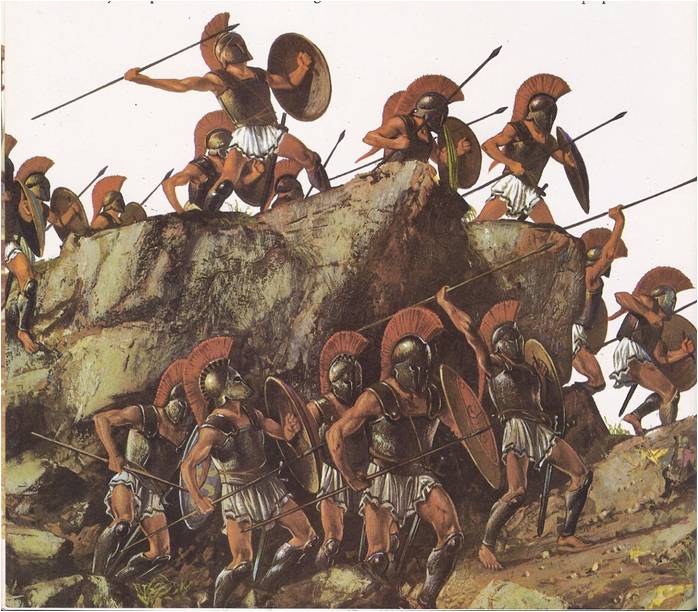A tyrant’s first problem was to seize power. Peisistratus had to solve this problem three times. In 560 he came before a meeting of the Assembly wounded and bleeding, alleging that his political opponents had attacked him. Sympathisers voted him a body-guard, with the aid of which he was able to seize power, but his opponents soon forced him to take flight. His next descent on the city was made in a chariot, in which he was accompanied by a handsome woman dressed up as Athena. He alleged that his companion was in fact Athena and that she had chosen …
Read More »Tag Archives: Hellespont
The Greeks Lead the Way
If you had been a citizen of the ancient Greek city of Athens on a fine spring morning in 409 B.C., you would have gathered with thousands of your fellow citizens on a hillside inside the city. You would then have listened carefully to the discussion of various matters of business, conducted by the chairman and secretary of the meeting from a platform below and facing you. You would have seen an Athenian citizen thread his way from the hillside to this platform. This was a sure sign that he had a proposal to make to the voters. The citizen …
Read More »The End of the City A. D. 192 – A. D. 476
ON ROME’S first day, Romulus took a bronze plow and drew a magic circle around seven of the hills that stood beside the River Tiber. The magic of the circle was protection against the evils outside. More important, it bound together the people who were inside, making one city where there had been six towns. Seven hundred years later, Augustus drew another magic circle, this time around all the Mediterranean world. It kept out barbarian and Asian invaders and held together millions of people, making one empire where there had been dozens of races and nations. So long as the …
Read More »The City of Aeneas 1000 B. C. – 500 B. C.
The minstrels who wandered from country to country in the ancient world told a legend of Aeneas, a Trojan prince. According to the story, Aeneas escaped the Greeks who broke through the walls of Troy and fled to his ships with a little band of warriors. Rowing out onto the Hellespont, they watched while a great fire destroyed their city and they knew that they could never return to Troy. Then, the storytellers said, the gods spoke to Aeneas, telling him to turn his ships west. They commanded him to sail away from the Hellespont and the Aegean Sea, past …
Read More »The Conquerors 343 B. C. – 323 B. C.
In 343 B. C., the philosopher Aristotle left the quiet of his study and journeyed to Macedonia, a country in the mountain wilderness north of Greece. He had been hired to tutor the rowdy young son of a king. The boy, Alexander, was a yellow-haired thirteen-year-old. His manners were polite and he seemed to be clever enough, but he was wild. It was hard for him to pay attention to his studies. He much preferred galloping across the fields on his huge horse. He proudly told his new tutor that he had tamed the horse himself. When he did come …
Read More »Greek Against Greek 430 B. C. – 404 B. C.
About 425 B. C., a lonely man, in a country that was not his own, sat down to write the story of a war that had begun six years before. Thucydides, an Athenian, had fought in the war’s first battles. He had been a general, in command of thousands of his city’s troops. Then he was ordered to go to the aid of another commander whose men were outnumbered. When he arrived, the battle had already been fought and lost. It was not his fault but the people of Athens were too anxious about the war to consider that. They …
Read More »Greece Fights for its Life 499 B. C.-479 B. C.
Across the Aegean, from the oriental court of King Darius of Persia, came messengers to all the city-states of mainland Greece. Their words were smooth, their smiles like sneers and they demanded gifts for their master – earth and water, the ancient tokens of tribute and surrender. The Greeks in Asia Minor already knew the Persians – too well; once the smiling messengers had come to the cities. After the messengers, the soldiers came, attacking the little poleis, one by one, until all of them were taken. Nothing could stop the Persian armies. From the capital, deep in Asia, they …
Read More »Companions of the King 1500 B.C. – 1000 B.C.
Across the plains of Peloponnesus, flashed the swift chariots of knights and warrior-princes. They wore armour of gleaming bronze and bright proud plumes bobbed above their helmets. They were the new men of a new country and they called themselves the Achaeans. Their kings called themselves the Sons of Pelops, the mighty chief and hero who had given his name to the Peloponnesus. Pelops, the Achaeans said, was the son of a god. Probably, however, he was the grandson of an European invader, for many of the Achaeans’ ancestors were barbarian invaders from the north. But they may have seemed …
Read More »






